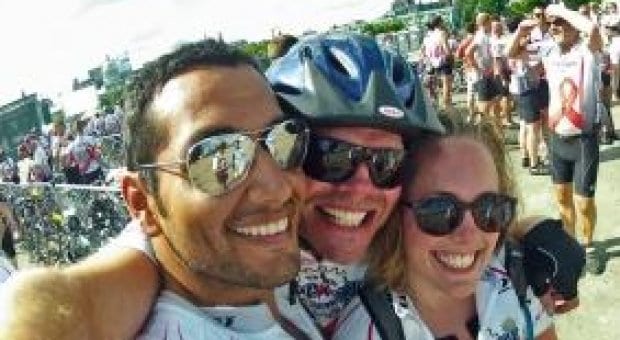Aug 2, day five of the Friends for Life Bike Rally, was Poz Day. Almost 300 riders wound their way for more than 100 kilometres along the shores of the St Lawrence River, following the beautiful Long Sault Parkway part of the way, arriving for the night at Glengarry Park Campground near Lancaster, Ontario.
Rally participants — riders and crew — who are living with HIV were invited to wear special red-ribbon T-shirts identifying themselves as being HIV-positive. For many people on the rally, that public declaration was just not something they wanted to do. For others, donning a shirt was an eagerly seized opportunity to wear a badge of honour, a mark of pride in themselves.
For still others, wearing a shirt was a furtive first public declaration that they are living with a virus that carries with it so much potential for stigma. They fretted, even surrounded by this most supportive of communities, that they would be judged harshly, that their friends would somehow think less of them. The simple act of pulling a T-shirt over their heads, smoothing the fabric across their bellies, adjusting the fit across their shoulders, and stepping into the crowded breakfast food line was, for them, a lonely act of courage. It was a coming-out experience.
That evening as the sun set, we gathered on a beautiful sandy beach at the river’s edge for what ride organizers call the candlelight ceremony. A handful of ride participants — some riders, some crew — stepped forward as the light faded and, in front of about 400 people, shared their personal stories and reflections.
There was the man who brought his two young sons — 15 and 18 — on the rally. He told the crowd that both young men had come out as gay in the past year, that the rally was a way to show them early how to protect themselves from becoming HIV-positive, and at the same time, paint for them a human face on HIV.
He wanted them to discover for themselves that HIV-positive people ought not to be feared or discriminated against. This father’s expression of love for his gay sons, his clear-eyed act of parental genius, brought tears to the eyes of many in the crowd, including this writer.
Others spoke of their struggles, regrets, victories, joys, hopes and fears. Some young gay men, who were recently diagnosed, told how they became positive. One shy and beautiful young man, new to the community, told of his gut-wrenching recent experience. It was a horrifying and tragic story of self-loathing that, frankly, startled those assembled. He sobbed hard with his head in his hands before describing his new path in life and his dreams for a bright future. I can’t imagine what it must have been like for him.
Staff and volunteers of the Toronto People with AIDS Foundation (PWA) spoke of their work with clients, how they helped individuals and whole families pick themselves up, dust themselves off, and move forward with their lives after facing devastating and tragic health challenges. It was a beautiful thing — that ceremony — that cast the entire rally into context.
These stories, or rather the people who told them, are why so many committed to raise the money, ride implausibly long distances on bicycles, and devote their summers to the cause.
But the mood that night was not the overarching mood on the rally.
Overall, riding the rally feels like a celebration. It’s a social event with shared, hard-core physical challenge. There is a sense of we-are-doing-this-together. And it really is so much fun. It’s an event crowded with people from all walks of life with incredible senses of playfulness and humour. And, aside from the sounds of the wind in my ears and the whine of my tires on the road, the uninterrupted peals of laughter at every rest stop, every camp site, is the sound that defined the experience for me.
On Aug 3, we gathered for lunch at Lachine and waited for every rider to arrive so we could cover the last few clicks into Montreal together. Each rider was wearing his or her ride jersey and the mood was celebratory as we slowly wound our way toward the finish line.
We arrived at Jacques-Cartier Pier in the Old Port of Montreal, the site of Festival Divers/Cité, to a corridor of smiling and cheering friends and crew. Music blared from the sound system set up for the huge party to commence later that night.
As we got off our bikes finally, we rubbed our sore asses and thighs, and hugs and smiles were shared all around. But that was only the beginning of the celebration, as most riders and crew spent the weekend celebrating together in Montreal.
This year’s rally raised more than $1.3 million for PWA, accounting for about 40 percent of the organization’s revenue. More money will come in over the coming weeks and months, and registration is open now for next year’s rally.
They say riding in the Friends for Life Bike Rally changes your life. I can see that. It’s truly an amazing experience. I wish I had done it years ago and would do it again in a heartbeat.

 Why you can trust Xtra
Why you can trust Xtra


